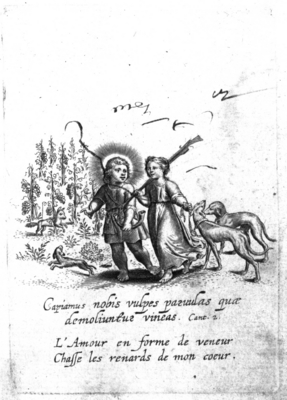Venatio Amoris [50]

VIII.
Ghisler.
QVid facis? o anima! insectaris vulpes? vulpes
paruulas? oleum & operam perdes. Ignorasne
illarum astutiam? si ignoras, nihil tibi sperandum
de venatione tuâ; si non ignoras, quid ad tam
difficilem te accingis prædam? noui astutiam vul-
pium & illam fateor, sed cum amor mecum sit,
hæc nihil illis proderit; quippe ipse multo astutior
& callidior, ipse author innocentis astutiæ, magi-
ster inuentionum, doctor subtilitatum, igitur ca-
piamus nobis vulpes paruulas, malas (inquam) il-
las cogitationes quæ piarum mentium spirituales
demoliuntur vineas, non solum morsibus pecca-
torum eas deuastantes, verum etiam illarum fru-
ctus absumentes, quibus absumptis, & demolitæ
apud Deum censentur; capiamus eas, cum pri-
mum exortæ fuerint, scientes non solum mihi esse
vtilissimum sed & ipsi optatissimum, capiamus
eas fugando, capiamus ligando, capiamus occi-
dendo.
QVid facis? o anima! insectaris vulpes? vulpes
paruulas? oleum & operam perdes. Ignorasne
illarum astutiam? si ignoras, nihil tibi sperandum
de venatione tuâ; si non ignoras, quid ad tam
difficilem te accingis prædam? noui astutiam vul-
pium & illam fateor, sed cum amor mecum sit,
hæc nihil illis proderit; quippe ipse multo astutior
& callidior, ipse author innocentis astutiæ, magi-
ster inuentionum, doctor subtilitatum, igitur ca-
piamus nobis vulpes paruulas, malas (inquam) il-
las cogitationes quæ piarum mentium spirituales
demoliuntur vineas, non solum morsibus pecca-
torum eas deuastantes, verum etiam illarum fru-
ctus absumentes, quibus absumptis, & demolitæ
apud Deum censentur; capiamus eas, cum pri-
mum exortæ fuerint, scientes non solum mihi esse
vtilissimum sed & ipsi optatissimum, capiamus
eas fugando, capiamus ligando, capiamus occi-
dendo.

Chasse de l'Amour.
VIII.
Dis moy, qui soit l'inuenteur des finesses,
Des beaux desseins, des ruzes & soupplesses,
Les plus madré, le plus subtil des Dieux?
Si les renards sont la plus fine race
Puis que l'amour les prend, attrape & chasse
Il faut qu' il soit plus fin encores qu' eux.
VIII.
Dis moy, qui soit l'inuenteur des finesses,
Des beaux desseins, des ruzes & soupplesses,
Les plus madré, le plus subtil des Dieux?
Si les renards sont la plus fine race
Puis que l'amour les prend, attrape & chasse
Il faut qu' il soit plus fin encores qu' eux.
Translations
 |
The hunting of love. |
 |
O soul! What are you doing? Chasing the foxes? The little foxes? You will waste the oil and the effort. Do you not know how
quick-witted they are? If you do not, you do not have to entertain any hopes regarding your hunt. If you are aware of it,
why are you getting yourself ready to go after such difficult prey? I know the astuteness of foxes and acknowledge it, but
when my love is with me, this cleverness will be no good to them. For He himself is far more astute and far more clever, the
master of inventions, doctor of subtleties.2 Therefore, let us catch for ourselves the little foxes, I mean those evil thoughts that ruin the spiritual vines of pious
minds, not only devastating them with the bites of sin, but also taking away their fruits, after the removal of which they
are also lost in the eyes of God. Let us catch them as soon as they crop up, in the knowledge that this is not only very useful
to me but also most welcome to Himself; let us catch them by driving them, let us catch them by tying them up, let us catch
them by killing them. |
 |
Let us catch the little foxes that ruin the vines.3 |
Literature
Sources and parallels
-
Possibly based on, nimbus given to Christ-child and vineyard enlarged, in: Venatio amoris. [20] (in: anonymous, Amoris divini et humani antipathia (1628))
[Compare
![Compare [compare]](/static/images/compare2.gif) ]
]
-
Parallel for the pictura (different facial expressions), the same Latin bible quote and French epigram in:'t Moet zyn gewied,, eer 't hooger schiet [10] (in: Jan van Hoogstraten, Zegepraal der goddelyke liefde (1709))
[Compare
![Compare [compare]](/static/images/compare2.gif) ]
]
References, across this site, to this page:
- Venatio amoris. [20] (in: anonymous, Amoris divini et humani antipathia (1628))
- 't Moet zyn gewied,, eer 't hooger schiet [10] (in: Jan van Hoogstraten, Zegepraal der goddelyke liefde (1709))
![[H O M E : Emblem Project Utrecht]](/static/images/rd-small.gif)




































































































